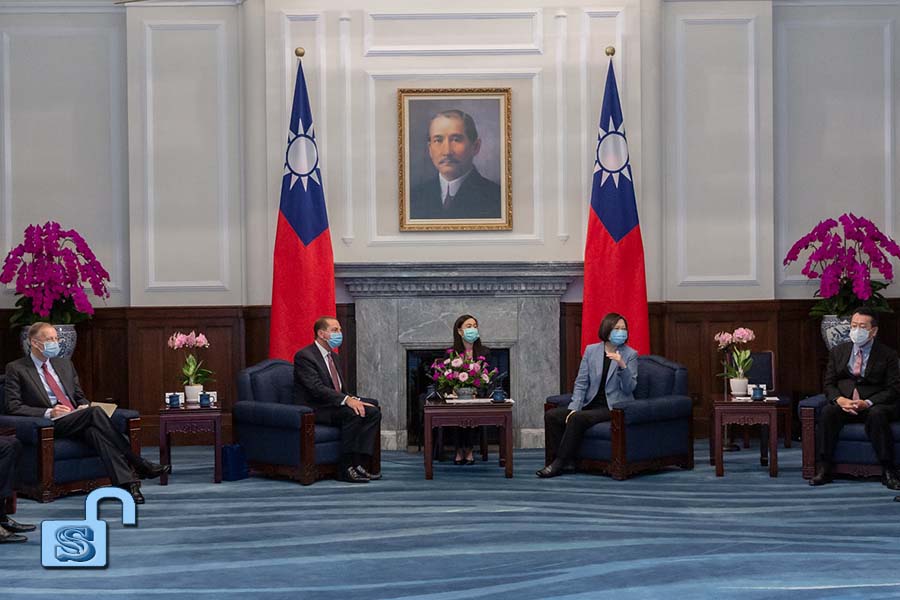◎ Countries, companies, and individuals would do well to “distrust and verify” in their dealings with the world’s last major communist state.
On Aug. 9, U.S. Health and Human Services Secretary Alex Azar arrived in Taiwan for a three-day trip. The following day, he met with Taiwan president Tsai Ing-wen at the Republic of China (ROC) Presidential Office in Taipei.
At the meeting, Azar praised the ROC’s response to the novel coronavirus pandemic, contrasting it favorably with Beijing’s coverup of the initial outbreak in Wuhan that led to the global crisis.
“Taiwan’s response to COVID-19 has been among the most successful in the world, and that is a tribute to the open, transparent, democratic nature of Taiwan’s society and culture,” said Azar, who is the highest-level American official to visit the ROC since 1979.
Shifting geopolitical reality
The Chinese Communist Party (CCP), which lays territorial claim to Taiwan, reacted to the Azar-Tsai meeting with sharp bellicosity. An hour before the event, the People’s Liberation Army dispatched J-10 and J-11 fighters to the strait separating Taiwan with mainland China, briefly crossing the mid-point line.
Beijing’s foreign ministry spokesman Zhao Lijian accused the United States of having “seriously violated its commitment on the Taiwan issue,” which he stressed as being “the most important and sensitive issue in China-U.S. relations.”
On Aug. 10, multiple influential pro-democracy figures were arrested in Hong Kong, where the CCP’s recent imposition of a draconian national security law has severely curtailed freedoms in the former British colony. Among those arrested were Jimmy Lai, the head of independent newspaper Apple Daily, and 23-year-old Agnes Chow, a social activist and prominent face at pro-democracy protests in Hong Kong in recent years. Around 200 officers took part in the raid on Apple Daily.
Azar’s ROC visit and the CCP’s reactions over Taiwan and Hong Kong are indicative of the emerging “new cold war” paradigm in U.S.-China relations.
Since December 2016, when newly elected U.S. President Donald Trump placed a phone call to Tsai Ing-wen, the United States has gradually helped Taiwan raise its international profile. Starting 2017, the year that the Trump administration introduced its National Security Strategy naming the People’s Republic of China (PRC) as America’s main competitor, Congress has issued 55 Taiwan-related bills.
On March 26, Trump signed the Taiwan Allies International Protection and Enhancement Initiative (TAIPEI) Act, following expanded sales of advanced weapons—including M1 Abrams tanks, F-16V fighter jets, and cutting-edge drones—to Taiwan.
Secretary Azar’s trip carries symbolic currency amid the coronavirus pandemic and the Trump administration’s escalating ideological confrontation with the CCP. Taiwan’s unmatched performance in controlling the local COVID-19 outbreak—with less than 500 cases and just a handful of deaths from the respiratory disease—highlights the contrast between the CCP’s authoritarian state and the ROC’s democratic open society, which the White House has lauded, in the words of U.S. Vice President Mike Pence, as showing “a better path for all the Chinese people.”
Diversionary measures
The COVID-19 pandemic provided the world with a clearer picture of CCP’s overseas influence operations. For instance, there is rising global awareness about the inroads the Party made with the World Health Organization, which repeated much of the CCP’s disinformation about the coronavirus.
Angered by the CCP’s attempts to use the disaster to further its international domination agenda, the Trump administration declared its plans to withdraw from WHO—an organization from which Taiwan is excluded. Washington and Taipei also drew even closer as a result of the CCP’s COVID opportunism.
The CCP has much reason to fear stronger U.S-ROC ties, especially in the current geopolitical climate. The coronavirus pandemic has proved ruinous for the global economy, and set back already questionable prospects of the U.S.-China “phase one” trade agreement being fulfilled. With President Trump believing that the trade deal now “means very little in the overall import of things,” the CCP has few tools to delay the “new cold war” developing between the American-led free world and the Party’s Marxist-Leninist dictatorship.
The closure of the PRC consulate in Houston—Beijing’s first foreign mission in the United States—last month, while showing that the Trump administration has little tolerance for Chinese espionage operations, also leaves the Taipei Economic and Cultural Office—Taiwan’s unofficial consulate—as the sole mission of a Chinese nation in the city. Regardless of how it is viewed from the White House, the significance of this is unlikely to be lost on the CCP, which could interpret the situation as another move toward U.S. de facto “recognition” of Taiwan.
Faced with a U.S. that is determined to call out and respond to its malign behavior, intimidation and distraction have become the Communist Party’s only workable defenses against the danger Taiwan’s democracy poses to PRC political legitimacy.
While the sortieing of PLA jets across the Taiwan Strait constitutes an intimidation tactic in reaction to the Azar-Tsai meeting, the roundup of pro-democracy figures in Hong Kong helped “capture” the news cycle, and hence, diffused public discourse surrounding a critical moment in U.S.-Taiwan relations. The Hong Kong distraction, however, once again highlights the CCP’s unyielding authoritarianism before foreign audiences, and could eventually come back to haunt it as the United States moves to confront the Communist Party across the board.
‘Distrust and verify’
In a July 23 speech on the CCP and its threat to the free world, U.S. Secretary of State Mike Pompeo paraphrased former President Ronald Reagan, who took an approach of “trust, but verify” in negotiations with the Soviet Union.
“When it comes to the [Chinese Communist Party], I say, we must ‘distrust and verify.’”
While the United States, Pompeo said, would maintain a relationship with mainland China, it fell to “every leader of every nation” to “insist on reciprocity, to insist on transparency and accountability from the Chinese Communist Party,” and that Washington should “empower” the Chinese people—who are distinct from the CCP.
The United States’ strengthening of relations with democratic Taiwan can be interpreted as a reflection of Pompeo’s call to define a China without the CCP, and a manifestation of clear “battle lines’ being drawn in the “new cold war.” Observers around the world should be aware of the emerging geopolitical paradigm in the U.S.-China dynamic.
The outcome of the U.S. presidential election in November is unlikely to significantly alter the coming trajectory of U.S.-China relations. Because there is strong bipartisan and popular support for strategic competition with China in America, a Biden victory could see only superficial changes to the existing U.S. policy on China. Indeed, much has already been set in stone, as the coronavirus pandemic and warming U.S.-Taiwan ties show.
Countries, companies, and individuals do not necessarily have to side with the Americans against the CCP. But they would do well to take a leaf out of Secretary Pompeo’s book and “distrust and verify” in their dealings with the world’s last major communist state.














